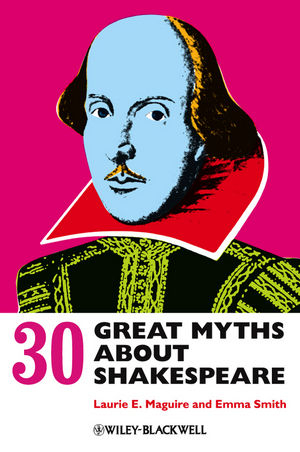
30 Great Myths about Shakespeare
Wiley-Blackwell (Verlag)
978-0-470-65851-2 (ISBN)
Think you know Shakespeare? Think again . . . Was a real skull used in the first performance of Hamlet? Were Shakespeare's plays Elizabethan blockbusters? How much do we really know about the playwright's life? And what of his notorious relationship with his wife? Exploring and exploding 30 popular myths about the great playwright, this illuminating new book evaluates all the evidence to show how historical material—or its absence—can be interpreted and misinterpreted, and what this reveals about our own personal investment in the stories we tell.
Laurie Maguire is Professor of English at the University of Oxford, tutorial fellow at Magdalen College, and the author or editor of seven books. She is a regular theater reviewer for the TLS and has lectured widely across the UK and the USA. Emma Smith is tutorial fellow at Hertford College, Oxford. She is the author or editor of six books, a regular reviewer for the TLS, and has lectured widely across the UK and the USA. The authors have previously collaborated together on articles on Middleton and Shakespeare and on graduate courses at the University of Oxford.
Introduction 1 Myth 1 Shakespeare was the most popular writer of his time 6
Myth 2 Shakespeare was not well educated 11
Myth 3 Shakespeare’s plays should be performed in Elizabethan dress 18
Myth 4 Shakespeare was not interested in having his plays printed 26
Myth 5 Shakespeare never traveled 34
Myth 6 Shakespeare’s plays are politically incorrect 40
Myth 7 Shakespeare was a Catholic 47
Myth 8 Shakespeare’s plays had no scenery 54
Myth 9 Shakespeare’s tragedies are more serious than his comedies 60
Myth 10 Shakespeare hated his wife 66
Myth 11 Shakespeare wrote in the rhythms of everyday speech 72
Myth 12 Hamlet was named after Shakespeare’s son 80
Myth 13 The coarse bits of Shakespeare are for the groundlings; the philosophy is for the upper classes 86
Myth 14 Shakespeare was a Stratford playwright 94
Myth 15 Shakespeare was a plagiarist 99
Myth 16 We don’t know much about Shakespeare’s life 106
Myth 17 Shakespeare wrote alone 113
Myth 18 Shakespeare’s sonnets are autobiographical 119
Myth 19 If Shakespeare were writing now, he’d be writing forHollywood 125
Myth 20 The Tempest was Shakespeare’s farewell to the stage 130
Myth 21 Shakespeare had a huge vocabulary 137
Myth 22 Shakespeare’s plays are timeless 143
Myth 23 Macbeth is jinxed in the theater 150
Myth 24 Shakespeare did not revise his plays 156
Myth 25 Boy actors played women’s roles 163
Myth 26 Shakespeare’s plays don’t work as movies 169
Myth 27 Yorick’s skull was real 175
Myth 28 Queen Elizabeth loved Shakespeare’s plays 183
Myth 29 Shakespeare’s characters are like real people 190
Myth 30 Shakespeare didn’t write Shakespeare 196
Coda 202
Further Reading 207
Index 211
| Erscheint lt. Verlag | 22.1.2013 |
|---|---|
| Verlagsort | Hoboken |
| Sprache | englisch |
| Maße | 152 x 229 mm |
| Gewicht | 295 g |
| Themenwelt | Kunst / Musik / Theater |
| Geisteswissenschaften ► Sprach- / Literaturwissenschaft ► Anglistik / Amerikanistik | |
| Geisteswissenschaften ► Sprach- / Literaturwissenschaft ► Literaturgeschichte | |
| Geisteswissenschaften ► Sprach- / Literaturwissenschaft ► Literaturwissenschaft | |
| ISBN-10 | 0-470-65851-7 / 0470658517 |
| ISBN-13 | 978-0-470-65851-2 / 9780470658512 |
| Zustand | Neuware |
| Haben Sie eine Frage zum Produkt? |
aus dem Bereich


